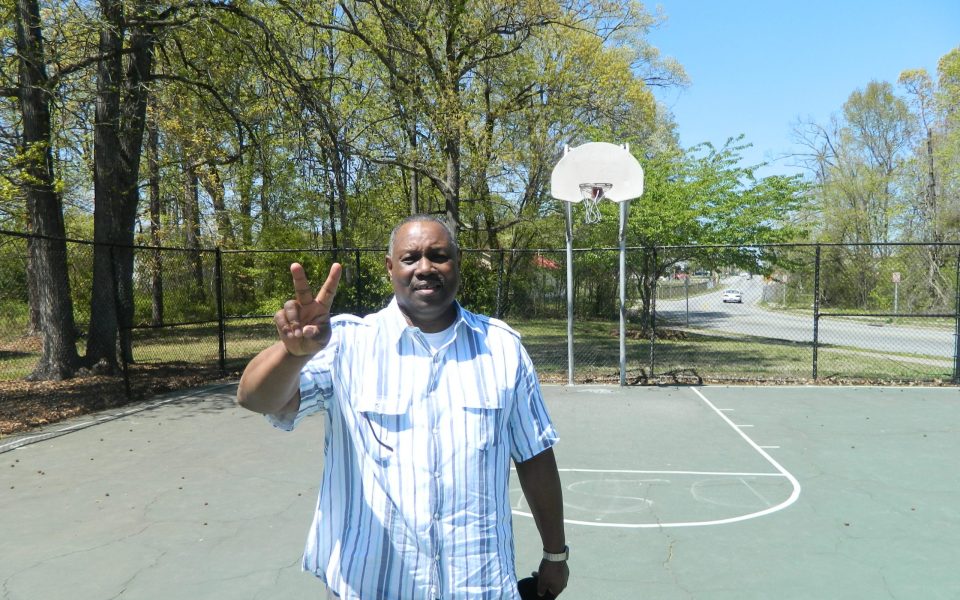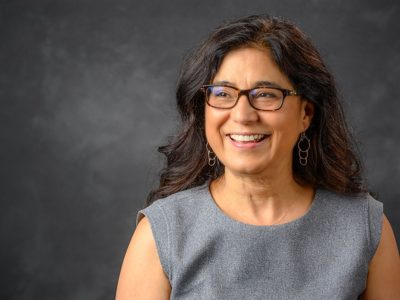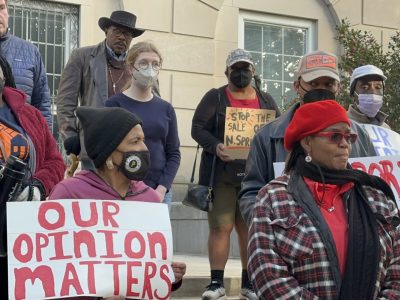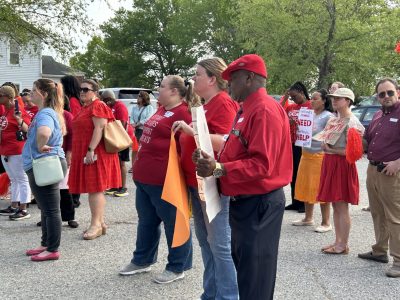by Jordan Green
A pastor and former member of the Black Panther Party embraces unity in response to both the George Zimmerman acquittal and a distressing spate of black-on-black violence in High Point.
When young black men commit violence against each other, the pain is no less acute for the Rev. Brad Lilley than when they are attacked by white racists.
Lilley, a former member of the Black Panther Party and pastor at Shekinah Glory Church International in High Point Unity, a group convened by Lilley, held a rally on the steps of the Municipal Building in September 2013 to protest the acquittal of George Zimmerman in the killing of Trayvon Martin, a black Florida teenager.
The concept of unity embodies Lilley’s response to violence.
“I spoke to a lot of young blacks,” the pastor and ex-Panther recalled. “They were expressing their frustration — boys and girls. I heard parents say they were afraid to let their children go to the store. What Unity saw was it was slowly turning into a race issue. We wanted it to be an issue of equal justice.”
More recently, Lilley has become concerned about a stubborn string of acts of violence committed by young black men against each other.
High Point has a nationally recognized intervention program to redirect serious felons, and police Chief Marty Sumner told NPR in January that the city’s violent crime rate has fallen 64 percent since the effort was launched.
Even if the trends are positive overall, Lilley can’t be satisfied when he sees continuing violence in the neighborhoods surrounding his church. He reeled off a list of disturbing incidents during an interview earlier this week in his pastoral office.
“There was a street fight on the Southside,” he said. “There was a 14-year-old boy shot in the jaw by a 16-year-old. To me, that’s getting worse. There was a stabbing on the basketball court. There was a young man shot a block from my church. The question is, why? There as a guy that got shot and killed at a birthday party, and I don’t really understand what happened. You just don’t have all the answers.
On the afternoon of Feb. 19 a young man was stabbed on the basketball court at the corner of Meredith Street and Furlough Avenue. A High Point police officer who responded to the scene found the victim on the porch of a nearby house, tended to his wounds and saved his life.
A community response emerged, Lilley said, from people asking themselves a simple question: What can we do? Lilley, Cynthia Davis and Kevin Able undertook the initial planning for a Peace Party, which was held on March 22 near the site of the stabbing at the corner of Meredith Street and Furlough Avenue.
“As adults we have to let young people know that we consider our basketball courts and playgrounds to be safe havens,” Lilley said.
Again, Lilley placed emphasis on unity in response to an act of violence.
“When word got out that we were doing this Peace Party, we were contacted by a lot of different people who wanted to be involved,” Lilley recounted. “Everybody is aware of violence in our community. We didn’t know there would be so many people who were interested.”
The Washington Street Business Association, One Hundred Men Praying and the Ministers’ Task Force quickly signed on. The police department expressed support and sent a captain to speak at the event. A young man launched a Facebook page called Save Our Youth, which quickly attracted 1,200 followers.
Two DJs, known as Ronnie Ron and the Quiet Storm, offered their services.
“They told me: ‘We were trying to figure out what we could do to help our community, and we heard about you,’” Lilley said. “‘Do you need DJs?’ ‘Yes, bring your music.’”
William Hayes, a defensive end for the St. Louis Rams and High Point native, has offered to come speak at events with other NFL players whenever he’s available.
Lilley said he received two phone calls on Monday from people who wanted to know when the next Peace Party would be held.
Tonya Thornton, who founded the organization Building Better Blocks, has enlisted Lilley’s support for an anti-violence event on Washington Street that is scheduled for June 28. The three-part event will include a panel discussion, including local elected officials, a mother who lost a child to street violence and an ex-offender who will talk about the consequences of taking another person’s life. A parade will represent different churches and organizations. The event will culminate in a show featuring mimes, spiritual dance, among other performances.
The causes of black-on-black violence are in some ways a reflection of the way black lives are devalued in the criminal justice system and in society at large, Lilley believes.
“There were street fights,” he said. “I asked them: ‘What was it about?’ They said, ‘This is our neighborhood.’
“Because of the frustration it’s a thing where a young black man wants to be respected, wants to be treated right. They’re not able to strike at that white racist because they would end up in jail, but here’s somebody they deal with everyday and the least little thing sets them off. They want to be respected in their own little world. If they’re not going to be respected in society, they’re going to be respected among black men.”
The 62-year-old Lilley came to High Point at the age of 18 and joined the Black Panther Party.
“We were feeding children and giving out bags of groceries,” he said. “We were the ones that first pushed for sickle cell testing. We were about addressing the needs of the community. We felt like a child could not learn if they are going to school hungry. We provided a proper breakfast of eggs, grits, bacon, milk and orange juice.”
Later, Lilley became interested in spirituality.
“I went through a lot of stuff,” he said. “Around the age of 30 I changed my life and got saved. I began to study the Bible and I read where Jesus said, ‘Inasmuch as you have done this for the least of these, so too have you done it for me.’ He begins to list these things: Feed the poor, clothe the naked, visit the prisoners. I said, ‘These are all things I learned in the Panthers.”
It would be a mistake to conclude that his promotion of unity as a response to violence represents a change of heart from his younger days, pointing out that the Black Panthers actively formed coalitions with white people who shared their values.
“Jesus in his time was called a revolutionary,” Lilley said. “He was called a troublemaker.”
He smiled slyly.
“It’s fitting that it’s just past Easter when I bring it up.”
Join the First Amendment Society, a membership that goes directly to funding TCB‘s newsroom.
We believe that reporting can save the world.
The TCB First Amendment Society recognizes the vital role of a free, unfettered press with a bundling of local experiences designed to build community, and unique engagements with our newsroom that will help you understand, and shape, local journalism’s critical role in uplifting the people in our cities.
All revenue goes directly into the newsroom as reporters’ salaries and freelance commissions.





I love what Pastor Lilley and the crew are doing there in High Point
Yes; nice article and what folks see on a daily basis, Hollyhood, that is, probably gets the small mind turning. The wrong way.